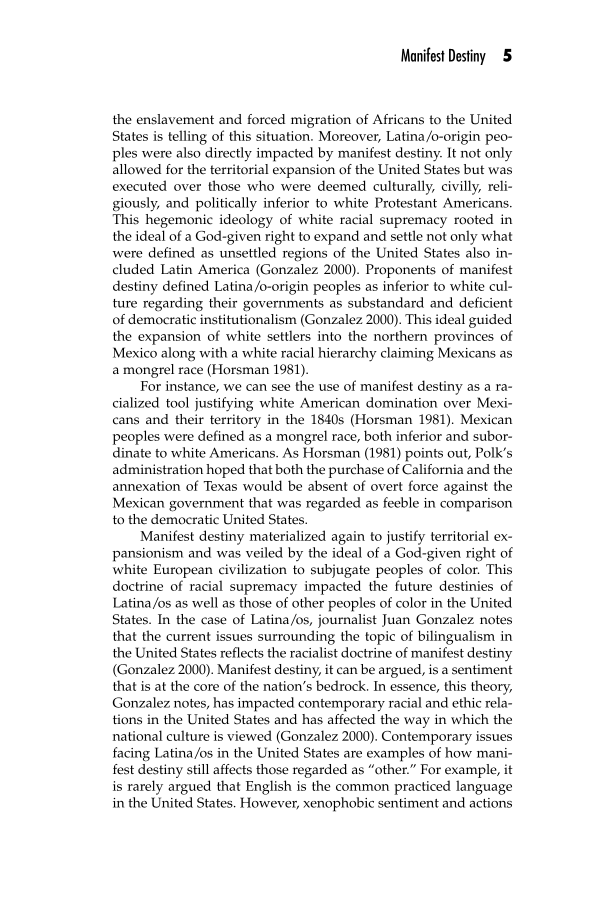Manifest Destiny 5 the enslavement and forced migration of Africans to the United States is telling of this situation. Moreover, Latina/o- origin peo- ples were also directly impacted by manifest destiny. It not only allowed for the territorial expansion of the United States but was executed over those who were deemed culturally, civilly, reli- giously, and politically inferior to white Protestant Americans. This hegemonic ideology of white racial supremacy rooted in the ideal of a God-given right to expand and settle not only what were defined as unsettled regions of the United States also in- cluded Latin America (Gonzalez 2000). Proponents of manifest destiny defined Latina/o-origin peoples as inferior to white cul- ture regarding their governments as substandard and deficient of democratic institutionalism (Gonzalez 2000). This ideal guided the expansion of white settlers into the northern provinces of Mexico along with a white racial hierarchy claiming Mexicans as a mongrel race (Horsman 1981). For instance, we can see the use of manifest destiny as a ra- cialized tool justifying white American domination over Mexi- cans and their territory in the 1840s (Horsman 1981). Mexican peoples were defined as a mongrel race, both inferior and subor- dinate to white Americans. As Horsman (1981) points out, Polk’s administration hoped that both the purchase of California and the annexation of Texas would be absent of overt force against the Mexican government that was regarded as feeble in comparison to the democratic United States. Manifest destiny materialized again to justify territorial ex- pansionism and was veiled by the ideal of a God-given right of white European civilization to subjugate peoples of color. This doctrine of racial supremacy impacted the future destinies of Latina/os as well as those of other peoples of color in the United States. In the case of Latina/os, journalist Juan Gonzalez notes that the current issues surrounding the topic of bilingualism in the United States reflects the racialist doctrine of manifest destiny (Gonzalez 2000). Manifest destiny, it can be argued, is a sentiment that is at the core of the nation’s bedrock. In essence, this theory, Gonzalez notes, has impacted contemporary racial and ethic rela- tions in the United States and has affected the way in which the national culture is viewed (Gonzalez 2000). Contemporary issues facing Latina/os in the United States are examples of how mani- fest destiny still affects those regarded as “other.” For example, it is rarely argued that English is the common practiced language in the United States. However, xenophobic sentiment and actions
Document Details My Account Print multiple pages
Print
You have printed 0 times in the last 24 hours.
Your print count will reset on at .
You may print 0 more time(s) before then.
You may print a maximum of 0 pages at a time.














































































































































































































































































































